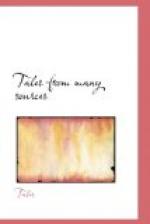Not that John Broom was her only hearer. Annie “the lass” sat by the hearth also, and Thomasina took care that she did not “sit with her hands before her.” And a little farther away sat the cowherd.
He had a sleeping-room above the barn, and took his meals in the house. By Miss Betty’s desire he always went in to family prayers after supper, when he sat as close as possible to the door, under an uncomfortable consciousness that Thomasina did not think his boots clean enough for the occasion and would find something to pick off the carpet as she followed him out, however hardly he might have used the door-scraper beforehand.
It might be a difficult matter to decide which he liked best, beer or John Broom. But next to these he liked Thomasina’s stories.
Thomasina was kind to him. With all his failings and the dirt on his boots, she liked him better than the farm-bailiff. The farm-bailiff was thrifty, and sensible and faithful, and Thomasina was faithful and sensible and thrifty, and they each had a tendency to claim the monopoly of those virtues. Notable people complain, very properly, of thriftless and untidy ones, but they sometimes agree better with them than with rival notabilities. And so Thomasina’s broad face beamed benevolently as she bid the cowherd “draw up” to the fire, and he who (like Thomasina) was a native of the country, would confirm the marvels she related, with a proper pride in the wonderful district to which they both belonged.
He would help her out sometimes with names and dates in a local biography. By his own account he knew the man who was murdered at the inn in the Black Valley so intimately that it turned Annie the lass as white as a dish-cloth to sit beside him. If Thomasina said that folk were yet alive who had seen the little green men dance in Dawborough Croft the cowherd would smack his knees and cry, “Scores on ’em!” And when she whispered of the white figure which stood at the cross roads after midnight, he testified to having seen it himself—tall beyond mortal height, and pointing four ways at once. He had a legend of his own too, which Thomasina sometimes gave him the chance of telling, of how he was followed home one moonlight night by a black Something as big as a young calf, which “wimmled and wammled,” around him till he fell senseless into the ditch, and being found there by the farm-bailiff on his return from market was unjustly accused of the vice of intoxication.
“Fault-finders should be free of flaws,” Thomasina would say with a prim chin. She had seen the farm-bailiff himself “the worse” for more than his supper beer.
But there was one history which Thomasina was always loth to relate, and it was that which both John Broom and the cowherd especially preferred—the history of the Lob Lie-by-the-fire.
Thomasina had a feeling (which was shared by Annie the lass) that it was better not to talk of “anything” peculiar to the house in which you were living. One’s neighbours’ ghosts and bogles are another matter.




